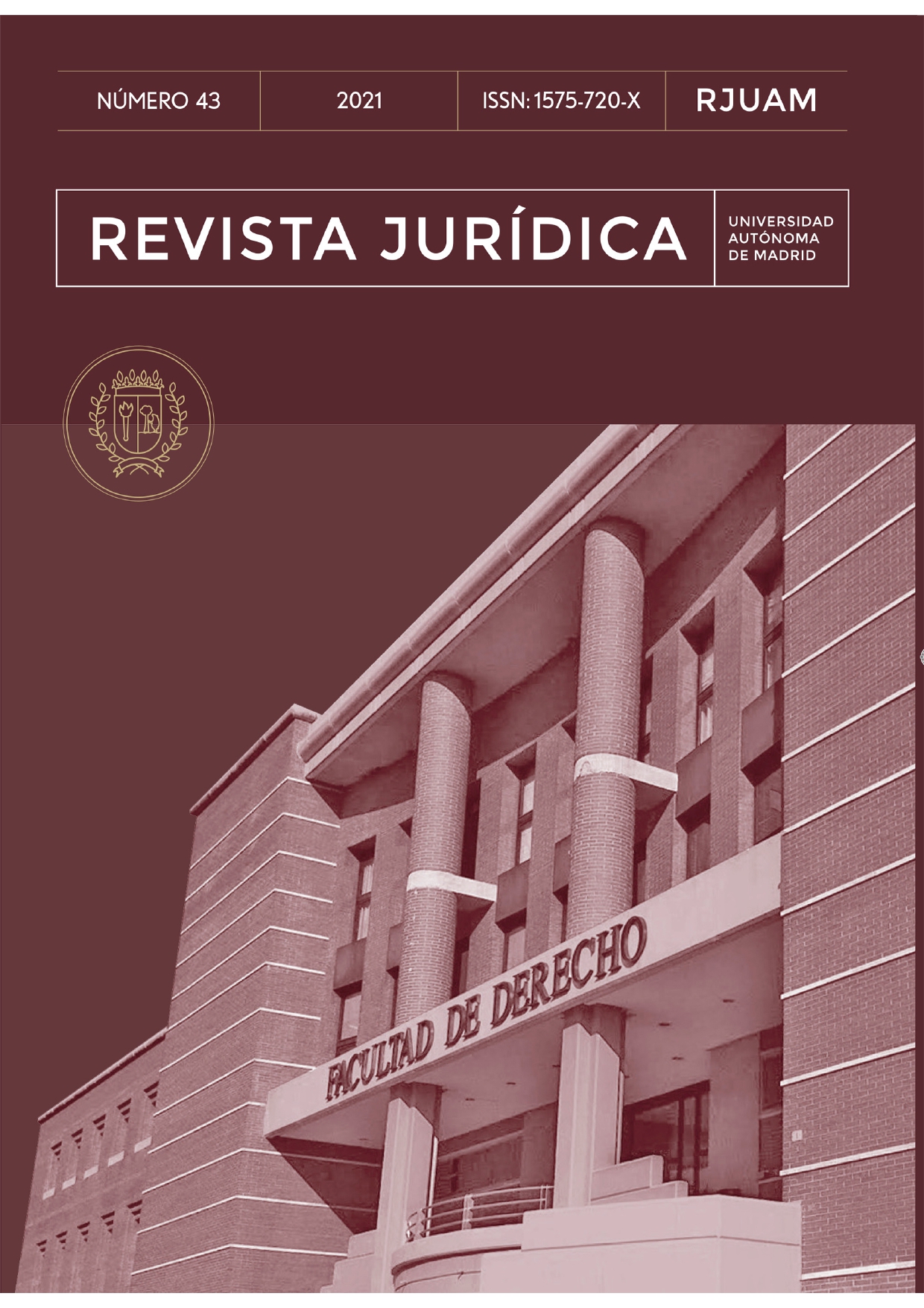The principle of equitable and reasonable utilization and participation and the protection of the environment on the un intenational watercourses covention
Keywords:
shared water resources, environmental protection, equitable and reasonable utilization, international watercoursesCopyright (c) 2021 Revista Jurídica Universidad Autónoma de Madrid

This work is licensed under a Creative Commons Attribution-NonCommercial-NoDerivatives 4.0 International License.
Abstract
The principle of equitable and reasonable utilization is the cornerstone on which the international legal regime for the protection of shared water resources is articulated. As for the Convention on the Law of the Non-navigational Uses of International Watercourses, this principle holds primacy over the other principles and substantive rules. In this research we assert that hierarchical subordination prevents from ensuring effective environmental protection and water resources sustainability. Furthermore, the existence of another international treaty regulating the same subject from an environmental approach not only challenges this primacy, but the overall relevance of the Convention as a global reference instrument.
Downloads
References
Monografías
KAYA, I., Equitable Utilization. The Law of the Non-Navigational Uses of International Watercourses, Aldershot (Ashgate), 2003.
LAMMERS, J. G., Pollution of International Watercourses: The Search for Substantive Rules and Principles of Law, La Haya (Martinus Nijhoff Publishers), 1984.
MCCAFFREY, S. C., The Law of International Watercourses, 3.ª ed., Oxford (Oxford University Press), 2019.
PASTOR RIDRUEJO, J. A., Curso de Derecho Internacional Público y Organizaciones Internacionales, 24.ª ed., Madrid (Tecnos), 2020.
RIEU-CLARKE, A., International Law and Sustainable Development: Lessons from the Law of International Watercourses, Londres (IWA Publishing), 2005.
RIEU-CLARKE, A., MOYNIHAN, R. y MAGSIG, B-O., UN Watercourses Convention. User’s Guide, Dundee (IHP-HELP Centre for Water Law), 2012.
SERENO ROSADO, A., Ríos que nos separan, aguas que nos unen. Análisis jurídico de los convenios hispano-lusos sobre aguas internacionales, Valladolid (Fundación Lex Nova), 2011.
SOHNLE, J., Le droit international des ressources en eau douce: solidarité contre souveraineté, París (La Documentation française, collection Monde européen et international), 2002.
TANZI, A., The Economic Commission for Europe Water Convention and the United Nations Watercourses Convention : an analysis of their harmonized contribution to international water law, Nueva York-Ginebra (UN Water Series), 2015.
Capítulos de libro
CARRILLO SALCEDO, J. A., «Droit international et souveraineté des États. Cours général de droit international public», Collected Courses of the Hague Academy of International Law, vol. 257, 1996, pp. 23 a 221.
DELLAPENNA, J. W., «The work of international legal expert bodies», en Research Handbook on International Water Law, Cheltenham (Edward Elgar Publishing), 2019, pp. 26 a 43.
SOHNLE, J., «La protection des eaux douces», en Droit International de l’Environnement», Montreal (Yvon Blais), 2016, pp. 523 a 596.
Artículos
ABRAMS, I. «The Emergence of the International Law Societies», The Review of Politics, vol. 19, n.º 3, 1957, pp. 361 a 380.
ÁLVAREZ ARCÁ, I., «La necesaria codificación del derecho humano al agua y el saneamiento», Cuadernos Electrónicos de Filosofía del Derecho, n.º 39, 2019, pp. 239 a 254.
ÁLVAREZ ARCÁ, I., «Una reflexión en torno a la valoración del daño ambiental por parte de la CIJ en el asunto Costa Rica v. Nicaragua», Actualidad Jurídica Ambiental, n.º 110, 2021, pp. 4 a 39.
AURA Y LARIOS DE MEDRANO, A. M., «La realización del principio de utilización equitativa y razonable en la práctica fluvial hispano-lusa», Revista Española de Derecho Internacional, vol. LIX, n.º 2, 2007, pp. 697 a 712.
BATISTA MARTINS, M. A. y. MAGANO MARTINS, F. M., «La dependencia hídrica de Portugal respecto a España: cuestiones de política y seguridad», Revista Electrónica de Estudios Internacionales, n.º 33, 2017, pp. 1 a 23.
BOURNE, C. B., «The International Law Association’s Contribution to International Water Resources Law», Natural Resources Journal, vol. 36, núm. 2, 1996, pp. 155 a 159.
BOURNE, C. C., «The Primacy of the Principle of Equitable Utilization in the 1997 Watercourses Convention», Annuaire Canadien de Droit International, 1997, pp. 215 a 232.
CAFLISCH, L., «Regulation of the uses of international watercourses» en International Watercourses–enhancing cooperation and managing conflict, World Bank Technical Paper No. 414, Washington DC (World Bank), pp. 3 a 16.
MCCAFFREY, S. C., «UN Watercourses Convention. Implementation and Relationship to the UNECE Water Convention», Environmental Policy and Law, vol. 46, n.º 1, 2016, pp. 35 a 39.
MOVILLA PATEIRO, L., «La entrada en vigor de la Convención sobre el derecho de los usos de los cursos de agua internacionales para fines distintos de la navegación», Revista Española de Derecho Internacional, vol. LXVI, n.º 2, 2014, pp. 312 a 316.
SALMAN, M. A. S., «The Helsinki Rules, the UN Watercourses Convention and the Berlin Rules: Perspectives on International Water Law», Water Resources Development, vol. 23, n.º 4, 2007, pp. 625 a 640.
VICK, M. J., «The Law of International Waters: Reasonable Utilization», Chicago-Kent Journal of International and Comparative Law, vol. XII, n.º 1, 2012, pp. 141 a 178
WEGERICH, K. y OLSSON, O., «Late developers and the inequity of “equitable utilization” and the harm of “do no harm”», Water International, vol. 35, n. º 6, pp. 707 a 717.
